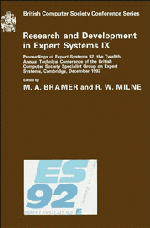Book contents
- Frontmatter
- Contents
- Preface
- Introduction
- CONSULTANT: providing advice for the machine learning toolbox
- A methods model for the integration of KBS and conventional information technology
- KBS methodology as a framework for co-operative working
- Project management for the evolutionary development of expert systems
- The specification and development of rule-based expert systems
- Towards a method for multi-agent system design
- Jigsaw: configuring knowledge acquisition tools
- On the relationship between repertory grid and term subsumption knowledge structures: theory practice tools
- Strategy maze: an on-line tool for support management of the knowledge acquisition process
- Concurrent engineering using collaborating truth maintenance systems
- Ockham's razor as a gardening tool
- A designer's consultant
- Fairness of attribute selection in probabilistic induction
- An application of case-based expert system technology to dynamic job-shop scheduling
- Neural network design via LP
- KEshell2: an intelligent learning data base system
- Approaches to self-explanation and system visibility in the context of application tasks
- An object oriented approach to distributed problem solving
- Intelligent user interface for multiple application systems
- Combining qualitative and quantitative information for temporal reasoning
- Documents as expert systems
The specification and development of rule-based expert systems
Published online by Cambridge University Press: 04 August 2010
- Frontmatter
- Contents
- Preface
- Introduction
- CONSULTANT: providing advice for the machine learning toolbox
- A methods model for the integration of KBS and conventional information technology
- KBS methodology as a framework for co-operative working
- Project management for the evolutionary development of expert systems
- The specification and development of rule-based expert systems
- Towards a method for multi-agent system design
- Jigsaw: configuring knowledge acquisition tools
- On the relationship between repertory grid and term subsumption knowledge structures: theory practice tools
- Strategy maze: an on-line tool for support management of the knowledge acquisition process
- Concurrent engineering using collaborating truth maintenance systems
- Ockham's razor as a gardening tool
- A designer's consultant
- Fairness of attribute selection in probabilistic induction
- An application of case-based expert system technology to dynamic job-shop scheduling
- Neural network design via LP
- KEshell2: an intelligent learning data base system
- Approaches to self-explanation and system visibility in the context of application tasks
- An object oriented approach to distributed problem solving
- Intelligent user interface for multiple application systems
- Combining qualitative and quantitative information for temporal reasoning
- Documents as expert systems
Summary
Abstract
This paper describes and illustrates the use of a methodology suitable for the formal development of expert systems. It addresses the problems of verification and validation of expert systems in a realistic way, though the methods are not advocated as a general tool for expert system development. The framework described allows for both the specification of Knowledge and the specification of the Inference methods which provide the basis for deduction. A flexible and extensible environment for the development and testing of specific types of expert system is presented. Various tools and results are shown to be useful in determining properties of both the knowledge base and the inference system when these are developed within the proposed framework.
The framework is based on exploitation of the transformational model of software development in combination with techniques from algebraic specification.
INTRODUCTION
The development of expert systems, within a formal development framework (see [Krieg-Brückner and Hoffmann 91]), can be seen as a significant advance in expert system technology. The benefits accrued from such an approach are substantial. In particular the following are notable: a formal foundation for reasoning about properties of the knowledge base and inference system is provided. Inductive and deductive methods are available to help in both the construction of the expert system and as a tool for analysis of the knowledge bases. A well defined language, with well defined semantics, provides the basis for specifying both the expert system and the associated knowledge bases.
- Type
- Chapter
- Information
- Research and Development in Expert Systems IX , pp. 75 - 92Publisher: Cambridge University PressPrint publication year: 1993



